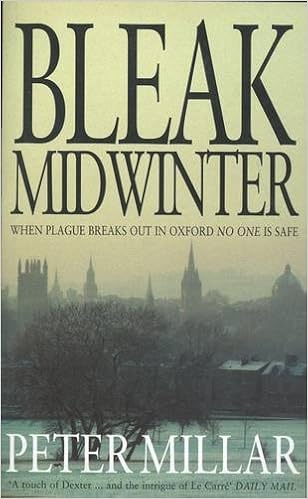Bleak Midwinter by Peter Millar
Bleak Midwinter by Peter Millar opens with a beautiful woman being murdered as she sunbathes by a hitman called Harold Hammerstein who aims to 'reduce her golden suntanned flesh to steak tartare'. He also 'grabbed hold of the elegant, gold-chained ankle [because despite being set around 2000 this supposedly stylish sophisticate sports accessories last seen in 1986] and pulled it to one side. Viciously. Leaving her legs splayed open at an obscene angle."
 If you're thinking that this all sounds like a bad made-for-TV miniseries from 30 years ago and that I should have stopped right there, you'd be correct, but I was on a long car journey and my other books were in the boot so I ploughed on.
If you're thinking that this all sounds like a bad made-for-TV miniseries from 30 years ago and that I should have stopped right there, you'd be correct, but I was on a long car journey and my other books were in the boot so I ploughed on.
 If you're thinking that this all sounds like a bad made-for-TV miniseries from 30 years ago and that I should have stopped right there, you'd be correct, but I was on a long car journey and my other books were in the boot so I ploughed on.
If you're thinking that this all sounds like a bad made-for-TV miniseries from 30 years ago and that I should have stopped right there, you'd be correct, but I was on a long car journey and my other books were in the boot so I ploughed on.
Despite the Florida prologue, Bleak Midwinter is mostly set in Oxford, where Daniel, a young American academic with no real personality and Therry, a local paper hack with a stupid name (she's the 'feisty', wisecracking type but hey, she has a kitten, so that means she has a soft side and is also, like almost every young woman who gets a mention in this book, 'pretty') team up to investigate a mysterious outbreak of bubonic plague discovered by Daniel's junior doctor friend, Rajiv. Rajiv was actually the most interesting character in the whole book by a country mile, but - spoiler alert - he dies (off-stage, to add insult to injury) near the beginning.
The bubonic plague plot was the main reason I picked up this book. Plague is something that's fascinated me for decades and I'm always intrigued at the notion of its return to the UK. Daniel and Therry are convinced the outbreak has been caused by a corrupt development company who have uncovered a dormant strain of the disease by digging up a former plague pit to build executive homes. This in itself is an interesting idea, but unfortunately it plays second fiddle to a different plot strand which is clunkily executed and nowhere near as engaging. Moreover, Millar seems far too interested in delivering a damning and at times embarrassingly snobby critique of rural house-building (the housing crisis is all just invented, people who live in new build houses are awful philistines and a saleswoman who works for the developer is a 'silly bitch' just for, well, doing her job) that frequently tips into Accidental Partridge territory. To give you a flavour of the level of subtlety, the developer's security firm is called Cerberus.
The dialogue throughout is largely terrible and littered with clichés. Everybody talks like a bad film script. The plot is a sort of hybrid between conspiracy adventure and post-Cold War spy thriller, but the two really don't sit easily together; instead of intertwining, one simply eclipses the other. The debunking of Daniel and Therry's various theories at the end mainly amounts to 'oh yes, I can see why you'd think that, but it was just a complete coincidence and actually this other terribly unlikely chain of events that you and the readers haven't really been engaging with because it's frankly paper-thin is behind it all. That far more interesting thread that you've been somewhat invested in? Red herring, and we're never speaking of it again. So, moving on...'
I wanted to like this book so much, so disappointment is probably a strong factor in my reaction to it here; it's much less annoying to expect a book to be terrible and be proved right than to have high hopes dashed. I rarely give very negative reviews for the simple reason that in most cases I stop reading books if I'm not enjoying them, and I never review a book I haven't finished. I probably should have done the same with this one.
Comments
Post a Comment